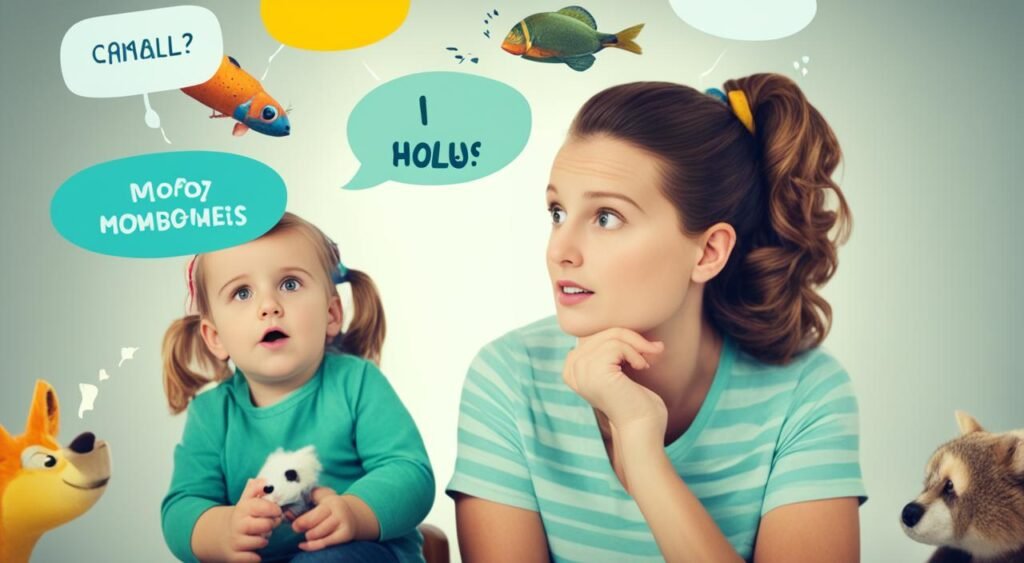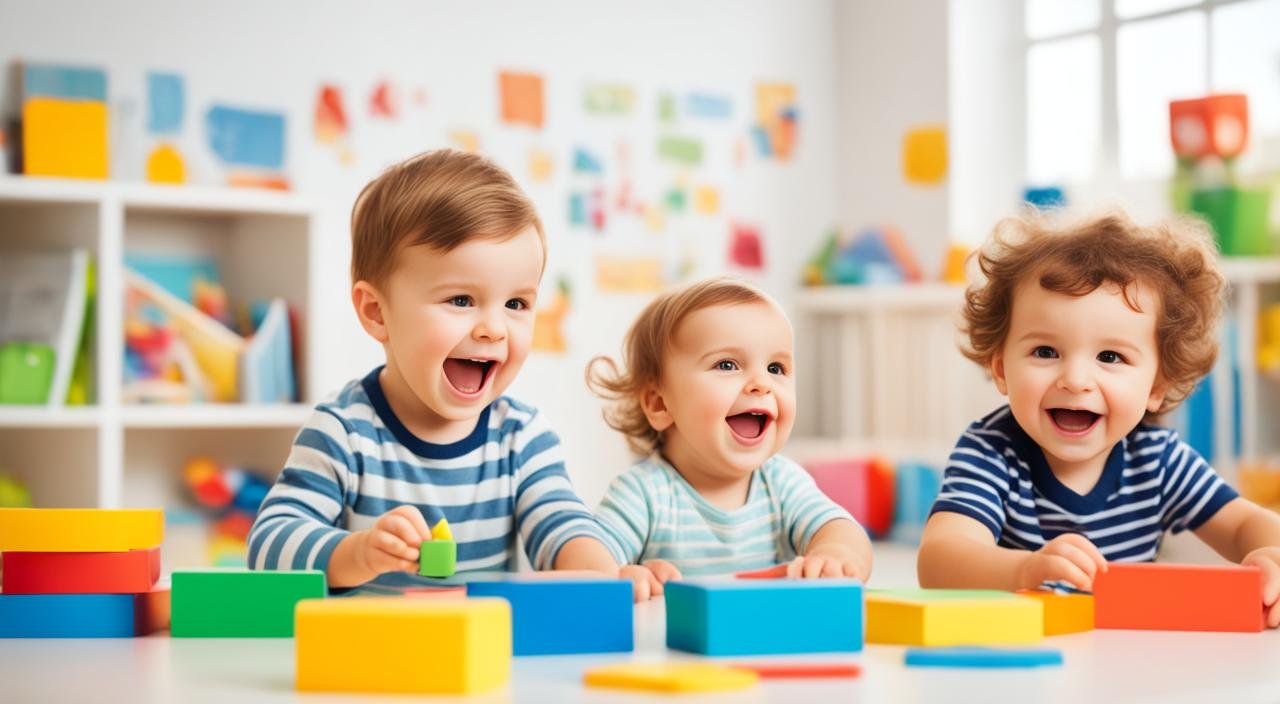Children go from first words to full sentences quickly in their early years. It’s tough for parents to know when their child should hit key understanding levels. Parents often wonder when their little one will really begin to talk.
Every child follows their unique path in development. Yet, talking to babies is critical for their language growth. Listening to their families is the main way kids learn to speak and expand their words.
Language experts have tips on how children learn to talk, from 1 to 4 years old.
Key Takeaways
- Children develop language skills at their own pace, with milestones serving as general guidelines rather than strict timelines.
- Talking, reading, and engaging with language daily helps foster a child’s speech understanding and verbal communication skills.
- Infant language development starts with recognizing sounds and goes on to babbling, first words, and finally sentences.
- At 12-24 months old, toddlers can follow simple directions and start saying two-word phrases.
- Preschoolers grow their vocabulary and understand grammar and sentence structure. They also take part in more complex conversation and storytelling.
Early Language Development Milestones
When a baby is born, their journey of language learning begins. Long before speaking, they show amazing skills. They can understand others and use gestures to communicate.
From Birth to 6 Months
During the first months, crying is a baby’s main way to talk. However, they are already recognizing familiar voices and reacting to sounds. Babies at this age love to laugh and babble as they try to copy sounds. Doctors check if they understand you, react to sounds, and follow simple directions.
Babbling and Recognizing Sounds
At around 8 to 9 months, babies start babbling with vowels and consonants. This babbling turns into the first words by their first birthday. Now, they can express what they want by pointing or looking at things. They also learn to follow your gaze. Gesturing is key for them to improve their thinking and language abilities.
What Age Do Kids Understand What You’re Saying?
Between 12-18 months, toddlers learn simple commands. They can raise their arms, sip water, hand over a toy, and stop at “no.” In the first year, they use body movement to talk, due to their small vocabulary.
Developing Vocabulary and Two-Word Phrases
By about 24 months, toddlers use around 50 words. They begin saying two-word phrases like “My ball” or “Car go.” This time is very exciting for language growth. Toddlers copy words they hear. Yet, only half of what they say is clear to others.
Toddler Language Comprehension

As toddlers turn two, they quickly get better at understanding words. They learn to know “me” and “you” but may mix them up. They start pointing to body parts and saying their names, showing they know simple words. And they can point to the right pictures, connecting words with what they see.
Grasping Grammar and Sentence Structure
By age 3, most people can get what a toddler’s saying most of the time. They can talk back and forth, ask questions, and tell about their day. Toddlers can now make simple sentences, like “Mommy is eating.” Parents should talk this way and have toddlers copy them. This helps kids learn grammar and how to use words right.
Engaging in Conversations and Storytelling
Toddlers soon begin to speak in simple but clear sentences. They can talk about their thoughts and feelings, and even tell short stories. This step is big because it lets toddlers share what they need and how they see things better.
Preschooler Language Skills
When preschoolers turn 4, they make big strides in talking. They start to use more words and longer sentences. This lets them have deeper talks with others.
Expanding Vocabulary and Sentence Length
At this age, preschoolers begin to name colors, shapes, and letters. They can now talk in longer, clearer sentences. This means they can share whole stories that adults understand.
They’re also learning about the order of the day. For example, breakfast comes first, then lunch, and dinner is last.
Following Multi-Step Instructions
At 4 years old, kids can follow several instructions. They might hear, “Put your book away, brush your teeth, and jump into bed.” Also, they can say what they want, like “I want pizza for dinner, and Toy Story before sleep.” This shows they’re understanding and talking more.
Expressing Complex Ideas and Emotions
By now, preschoolers can talk about their big ideas and feelings. They can share detailed stories and name their emotions. They ask questions to learn more. They’re also starting to connect stories from books to their own life. This shows they are getting better at telling stories and understanding bigger thoughts.
Conclusion
Every child’s language development path is special and may vary. Milestones are more like guides than strict deadlines. To foster your child’s language skills, surround them with opportunities for reading, talking, and using language daily.
If you’re worried about your child’s language development, talking to a doctor can help. They can offer custom advice and support.
Kids start by recognizing sounds and making sounds themselves. Soon, they say their first words and two-word phrases. This usually happens by the time they are 24 months old.
By the age of 4, kids should have more language skills. They can chat back and forth, understand complicated instructions, and share their feelings. If you notice that your child is having a hard time meeting these milestones, seek help early. Getting help soon can really boost your child’s chances of overcoming challenges.
Remember, each child is different. With time, encouragement, and the right help, they all can do well in their language journey.
FAQ
What age do kids start understanding what you’re saying?
Babies recognize their parents’ voices soon after birth. At 8-9 months, they start babbling with vowels and consonants. By their first birthday, kids can follow simple commands with purpose.
When do toddlers start using two-word phrases?
At 24 months, toddlers know around 50 words. They start combining words, saying things like “My ball” or “Car go.” This marks a key stage in their language growth, with their vocabulary expanding rapidly.
What language skills should a 3-year-old have?
At 3, toddlers can easily convey their messages most of the time. They talk in three to six-word sentences, ask and answer questions, and share their daily adventures with you. By now, their spoken language is clear.
What should a 4-year-old be able to do?
At age 4, children can relate stories that make sense to adults. They recognize colors, shapes, and some letters. They also start to understand time, knowing the order of daily events.
How advanced should a 4-year-old’s language be?
Four-year-olds can handle multiple-step directions, like “Clean up your toys, wash your hands, and come to the table to eat.” They express themselves clearly, sharing their desires and feelings in complex sentences with others.





